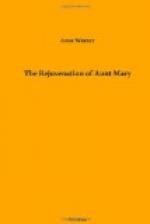The result was that the young man, finding the drawing-room unoccupied, was just crossing toward the blue velvet curtains, intending to wait in the library until the returning servant should advise him of the whereabouts of his mistress, when he was stopped by suddenly hearing a voice—her voice—crying (and laughing at the same time)—
“Kisses barred! Kisses barred!”
It may be understood that had Mrs. Rosscott known that anyone was within hearing she certainly would never have made any such speech, and it may be further understood that, had whoever was with her, also mistrusted the close propinquity of another man, he would never have replied (as he did reply):
“Certainly,” the same being spoken in a most calm and careless tone.
Jack, the eavesdropper, stood transfixed at the voices and speeches, and forgot every other consideration in the overwhelming sickness of soul which overcame him that instant. All his other soul-sicknesses were trifles compared to this one, and the world—his world—their world—seemed to revolve and whirl and turn upside down, as he steadied himself against a spindle-legged cabinet and felt its spindle-legs trembling in sympathy with his own.
“Darling,” said Holloway, a second or two later (and this time his voice was not calm and careless, but deep and impassioned), “the letter was very sweet, and if you knew how I longed to take the tired little girl to my bosom and comfort her troubles, and replace them by joys!”
“Will that day ever come, do you think?” Mrs. Rosscott answered, in low tones, which nevertheless were most painfully clear and distinct in the next room.
“It must,” Holloway replied, “just as surely as that I hold this dear little hand—”
But Jack never knew more. He had heard enough—more than enough. Four thousand times too much. He turned and went out of the rooms, back down the stairs and out of the door, closed it noiselessly behind him, and found himself in a world which, although bright and sunny to all the rest of mankind, had turned dark, lonely, and cheerless to him.
At first he hardly knew what to do with himself, he was so altogether used up by the discovery just made. He drifted up and down some unknown streets for an hour or two—or stood still on corners—he never was very sure which. And then at last he went downtown and took a drink in a half-dazed way; and because it was quite two months since his last indulgence, its suggestion was potent.
The pity—or rather, the apparent pity—of what followed!
Burnett was Sundaying at the ancestral castle; and Burnett wasn’t the warning sort, anyhow. He was always tow and pitch for any species of flame. So his absence counted for nothing in the crisis.
And what ensued was a crisis—a crisis with a vengeance.




